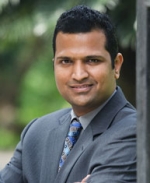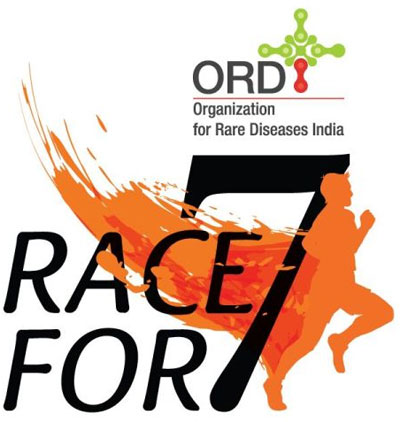 The Government of India is in a perfect position to provide direction and support to meet the urgent unmet needs of the 70+ million rare disease patients, says Harsha K Rajasimha, Founder Member, Organisation for Rare Diseases India.
The Government of India is in a perfect position to provide direction and support to meet the urgent unmet needs of the 70+ million rare disease patients, says Harsha K Rajasimha, Founder Member, Organisation for Rare Diseases India.
A rare or orphan disease is any single disease or condition that affects less than 0.1 per cent of the population. The US and European Union (EU) have developed rare disease definitions based on their population size and structure. About 30 million patients are estimated to be suffering from rare diseases in the US and another 30 million in the EU. Considering the population of India, a disease affecting one in 10,000 is considered rare or orphan. This may seem like a small number but it is important to note that when all rare diseases taken together, the number of patients affected is significantly large. About 7,000 to 8,000 different rare diseases affect over an estimated 80 million Indians. Some examples of rare diseases include Pompe, Hirschsprung disease, Gaucher?s disease, Cystic Fibrosis, Hemangiomas, and certain forms of muscular dystrophies.
Organization for Rare Diseases India (ORDI; www.ordindia.in) is a voluntary non-profit organisation founded to represent the collective voice and needs of the rare disease patients and stakeholders in India. ORDI aims to address the unmet needs and create opportunities that benefit rare disease patients in India. Based on our own experience and extensive feedback from the Indian rare disease community, we have identified several urgent action items for the benefit of Indian Rare Disease Patients:
New born screening for known rare diseases. This programme is running at select hospitals concentrated in New Delhi and there is compelling justification to scale up the new born screening program across India. We recommend covering all metro cities in India immediately with strategy to cover smaller towns and villages eventually. Genetic testing based diagnostics facilities equipped for rare disease diagnoses have to become widespread. Genetic counselling should be offered at these centres and all maternity hospitals. In 2007, there were only 47 recognised genetic testing centres. This number has increased steadily over the years but given the population of India, there is a huge unmet need for uniform distribution of such facilities.
Not all rare diseases are curable or treatable. There are about 500 approved orphan drugs in the market. Even when available, most patients cannot access and/or afford such treatments. The patients need accessibility to treatments when available either nationally or internationally. One example is Genzyme?s charitable access programme providing enzyme replacement
https://premier-pharmacy.com/product-category/sleeping-aids/
therapy for Lysosomal Storage Disorders (LSDs) patients in India.
Since a large number of treatments and orphan drugs are under development, there are opportunities to enroll eligible patients into ongoing or upcoming clinical trials. A transparent enrollment process for Indian rare disease patients into global clinical trials is an urgent and important need because majority of rare diseases have no available treatments. ORDI aims to develop a rare disease patient registry would enable and facilitate such a transparent clinical trials enrollment process.
For certain undiagnosed debilitating rare disease patients with significant special needs, home-based or typical hospital care may not be possible. Hence, special rehabilitation centres would need to be created to support such patients and their families.
All citizens, including those ~70 million rare disease patients, deserve access to all public amenities and services. Unfortunately, there is a significant lack of infrastructure to support disabled people at public service facilities such as government offices, banks, hospitals, educational institutions, and post offices in India. A systematic investment in such infrastructure enhancements is urgently needed.
The Government of India is in a perfect position to provide the direction and support for these urgent unmet needs of the 70+ million rare disease patients. We urge the Government of India to take steps outlined below in this regard including:
- Setting up an exclusive department to deal with rare disease patients? needs. Such a department should have appropriate budget to meet these above needs. A single window for clearance of import of orphan drugs and life-saving drugs would be ideal.
- The medical education and training programmes have to be updated to include not only the most common diseases but help create the next generation of doctors trained in diagnosing and treating rare and genetic diseases. These changes are aligned with the global medical community that is rapidly embracing the practice of ‘personalised’ medicine.
- Encourage the pharma research and development community to invest in discovery of novel diagnostic methods and orphan drug development by offering incentives. The US, Japan and other countries have enacted Orphan Drug Acts for this purpose in their respective countries since 1983, and the time is ripe for the most populous democracy to act now.
- ORDI aims to collaborate and formally engage with rare disease stakeholders in India including patient communities, physicians, biopharma industry, academic research community, and the state and national governments to facilitate a dialogue and catalyse progress to ultimately enable Indian rare disease patients to not only cope with their condition but also contribute to India?s growth.
https://pharma.financialexpress.com/sections/management/3051-urgently-require-systematic-investment-in-infrastructure-enhancements
 The Government of India is in a perfect position to provide direction and support to meet the urgent unmet needs of the 70+ million rare disease patients, says Harsha K Rajasimha, Founder Member, Organisation for Rare Diseases India.
The Government of India is in a perfect position to provide direction and support to meet the urgent unmet needs of the 70+ million rare disease patients, says Harsha K Rajasimha, Founder Member, Organisation for Rare Diseases India.


